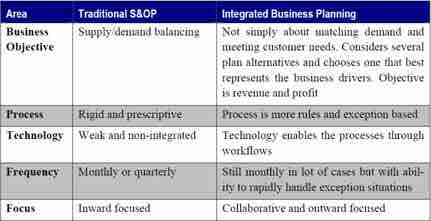The planning process is concerned with defining a company's goals and determining the resources necessary to achieve those goals. Achieving a vision requires coordinated efforts that adhere to a broader organizational plan. This is enabled through consistent strategies that are supported by staff at all levels. To meet business goals, managers develop business plans not only to reach targets but also to strengthen and change public perception of the company's brand.

Integrated business plan
This business plan takes aspects of a business and identifies clear goals for each: e.g., for the technology to move from being weak and non-integrated to enabling workflows, and for the business's focus to transition from being inwardly to outwardly focused.
Since they have achieved defined goals through the planning process, managers and employees can focus and control their efforts and their resources, follow determined plans of action, coordinate activities between divisions, and use time management to meet specific goals. Planning helps to achieve these goals or targets by efficiently and effectively using available time and resources. In short, planning, if executed properly, should lead to the following benefits:
Focus
There are a wide variety of activities an organization (or the individuals within the organization) might viably pursue. While there is value in the pursuit of many activities, understanding which ones the organization should focus on to leverage organizational competencies and align with market research requires careful planning and delegation. This is how planning achieves focus.
Coordinated Action
If department A is reliant on inputs from department B, department A cannot utilize department B's work without coordination. If department B has too much work and department A too little, there is poor interdepartmental coordination. This is alleviated through detail-oriented planning processes.
Control
The control process is based on benchmarks, which is to say that controlling requires a standard of comparison when viewing the actual operational results. Control relies on the planning process to set viable objectives, which can then be worked towards through controlling operations.
Time Management
Time management underlines the importance of maximizing the use of time to minimize the cost of production. If a full-time employee can accomplish their work within 32 hours, the planning process can find meaningful use for their remaining time. Costs can be lowered and productivity increased by ensuring that each element in the operational process functions according to ideal time constraints.
The Process Itself
Perhaps the most important benefit of developing business and marketing plans is the nature of the planning process itself. This typically offers a unique opportunity, a forum, for information-rich and productively focused discussions between the various managers involved. The plan and the discussions that arise from it provide an agreed context for subsequent management activities, even those not described in the plan itself.